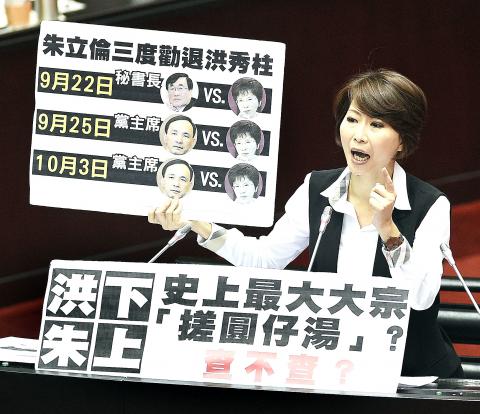While Chinese Nationalist Party (KMT) lawmakers do not overwhelmingly support the party’s plan to replace Hung Hsiu-chu (洪秀柱) as its presidential candidate, the lack of consensus is related more to the damage it would inflict to party solidarity than support for Hung.
As rumors about the KMT’s plan to change its presidential candidate begin to have more credence — with party members yesterday at a KMT Central Standing Committee (CSC) meeting proposing an extempore national congress to replace Hung — KMT lawmakers have begun to publicly express their views of Hung and a possible replacement.
KMT Legislator Lu Hsueh-chang (呂學樟), who is also a CSC member, said he pointed out at the meeting that Hung’s level of support in polls has been much lower than expected, adding that, because she has been “appealing to deep blue voters,” it might be more likely to attract swing voters if KMT Chairman Eric Chu (朱立倫) was representing the party instead.

Photo: Chen Chih-chu, Taipei Times
“Hung achieved what she set out to do, which was ‘toss out the brick [Hung] to attract the [participation] of jade [Chu],’” KMT Legislator Lo Shu-lei (羅淑蕾) said. “As jade is now available, the brick should withdraw.”
While Hung’s nomination was indeed procedurally official, “the KMT is teetering on the brink of collapse. Hung should evaluate whether she has the ability to provide momentum to the party’s overall campaign,” Lo said.
“If not, she should be wise enough to step down,” Lo added.
KMT Legislator Kung Wen-chi (孔文吉) criticized the party’s plan to change presidential candidate, calling on Chu and KMT leadership to “examine their wrongs” if the party really does plan to replace Hung.
“Why did nobody [else other than Hung] stand up and join the primary in the first place?” Kung said.
Kung said that replacing Hung now would deal a severe blow to the party’s solidarity, adding that if harmony is to be achieved, the KMT should amass strong support under the banner of “KMT presidential candidate Hung Hsiu-chu.”
KMT Legislator Wu Yu-sheng (吳育昇) said that Chu and Hung should have a thorough discussion “in the presence of other top party heavyweights, such as President Ma Ying-jeou (馬英九) and former chairmen Lien Chan (連戰) and Wu Po-hsiung (吳伯雄).”
Wu Yu-sheng said the point now is not who will represent the party, but rather the right it might cause if Hung’s nomination is canceled without her voluntary acceptance.
“A closed-door debate should be held [for the involved parties] to hash it out,” he said.

Alain Robert, known as the "French Spider-Man," praised Alex Honnold as exceptionally well-prepared after the US climber completed a free solo ascent of Taipei 101 yesterday. Robert said Honnold's ascent of the 508m-tall skyscraper in just more than one-and-a-half hours without using safety ropes or equipment was a remarkable achievement. "This is my life," he said in an interview conducted in French, adding that he liked the feeling of being "on the edge of danger." The 63-year-old Frenchman climbed Taipei 101 using ropes in December 2004, taking about four hours to reach the top. On a one-to-10 scale of difficulty, Robert said Taipei 101

A preclearance service to facilitate entry for people traveling to select airports in Japan would be available from Thursday next week to Feb. 25 at Taiwan Taoyuan International Airport, Taoyuan International Airport Corp (TIAC) said on Tuesday. The service was first made available to Taiwanese travelers throughout the winter vacation of 2024 and during the Lunar New Year holiday. In addition to flights to the Japanese cities of Hakodate, Asahikawa, Akita, Sendai, Niigata, Okayama, Takamatsu, Kumamoto and Kagoshima, the service would be available to travelers to Kobe and Oita. The service can be accessed by passengers of 15 flight routes operated by

Taiwanese and US defense groups are collaborating to introduce deployable, semi-autonomous manufacturing systems for drones and components in a boost to the nation’s supply chain resilience. Taiwan’s G-Tech Optroelectronics Corp subsidiary GTOC and the US’ Aerkomm Inc on Friday announced an agreement with fellow US-based Firestorm Lab to adopt the latter’s xCell, a technology featuring 3D printers fitted in 6.1m container units. The systems enable aerial platforms and parts to be produced in high volumes from dispersed nodes capable of rapid redeployment, to minimize the risk of enemy strikes and to meet field requirements, they said. Firestorm chief technology officer Ian Muceus said

MORE FALL: An investigation into one of Xi’s key cronies, part of a broader ‘anti-corruption’ drive, indicates that he might have a deep distrust in the military, an expert said China’s latest military purge underscores systemic risks in its shift from collective leadership to sole rule under Chinese President Xi Jinping (習近平), and could disrupt its chain of command and military capabilities, a national security official said yesterday. If decisionmaking within the Chinese Communist Party has become “irrational” under one-man rule, the Taiwan Strait and the regional situation must be approached with extreme caution, given unforeseen risks, they added. The anonymous official made the remarks as China’s Central Military Commission Vice Chairman Zhang Youxia (張又俠) and Joint Staff Department Chief of Staff Liu Zhenli (劉振立) were reportedly being investigated for suspected “serious